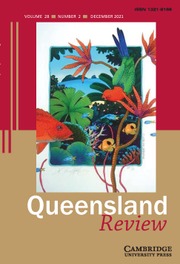Article contents
‘Let no one say the past is dead’: History wars and the poetry of Oodgeroo Noonuccal and Sonia Sanchez
Published online by Cambridge University Press: 04 June 2018
Abstract
The histories of Australian Aboriginal and African American peoples have been disregarded for more than two centuries. In the 1960s, Aboriginal and African American civil rights activists addressed this neglect. Each endeavoured to write a critical version of history that included their people(s). This article highlights the role of Aboriginal Australian poet Oodgeroo Noonuccal (formerly Kath Walker) (1920–93) and African American poet Sonia Sanchez (born 1934) in reviving their peoples’ history. Using Deleuze and Guattari's concept of ‘minor literature’, the essay shows how these poets deterritorialise the English language and English poetry and exploit their own poetries as counter-histories to record milestone events in the history of their peoples. It will also highlight the importance of these accounts in this ‘history war’. It examines selected poems from Oodgeroo's My People: A Kath Walker Collection and Sanchez's Home Coming and We A BaddDDD People to demonstrate that similarities in their poetic themes are the result of a common awareness of a global movement of black resistance. This shared awareness is significant despite the fact that the poets have different ethnicities and little direct literary impact upon each other.
- Type
- General articles
- Information
- Copyright
- Copyright © The Author(s) 2018
References
- 1
- Cited by




